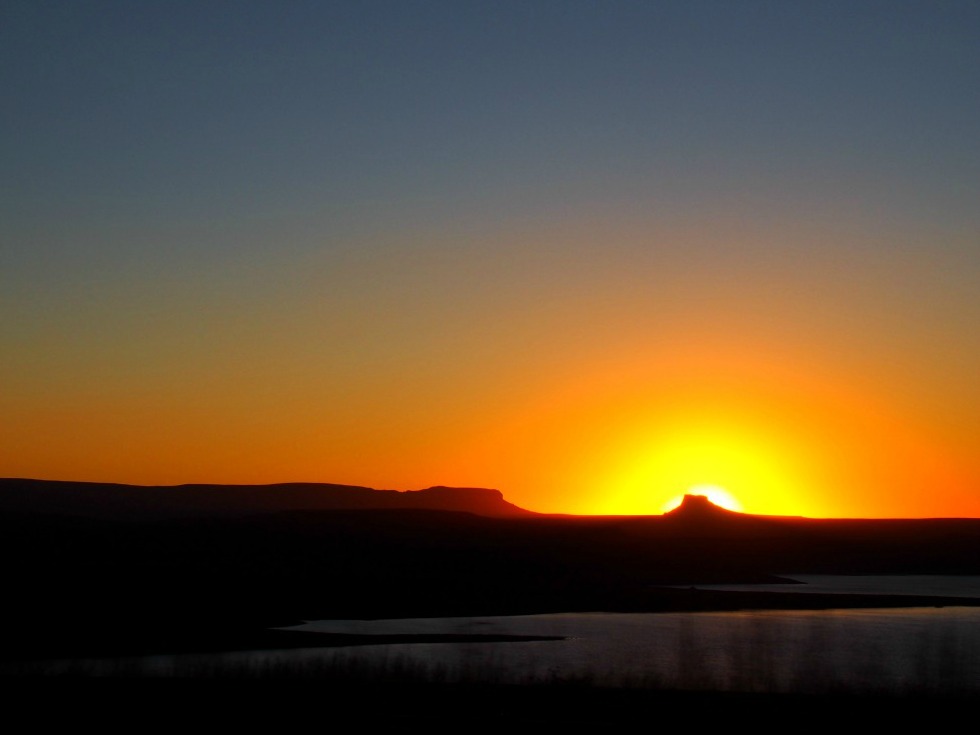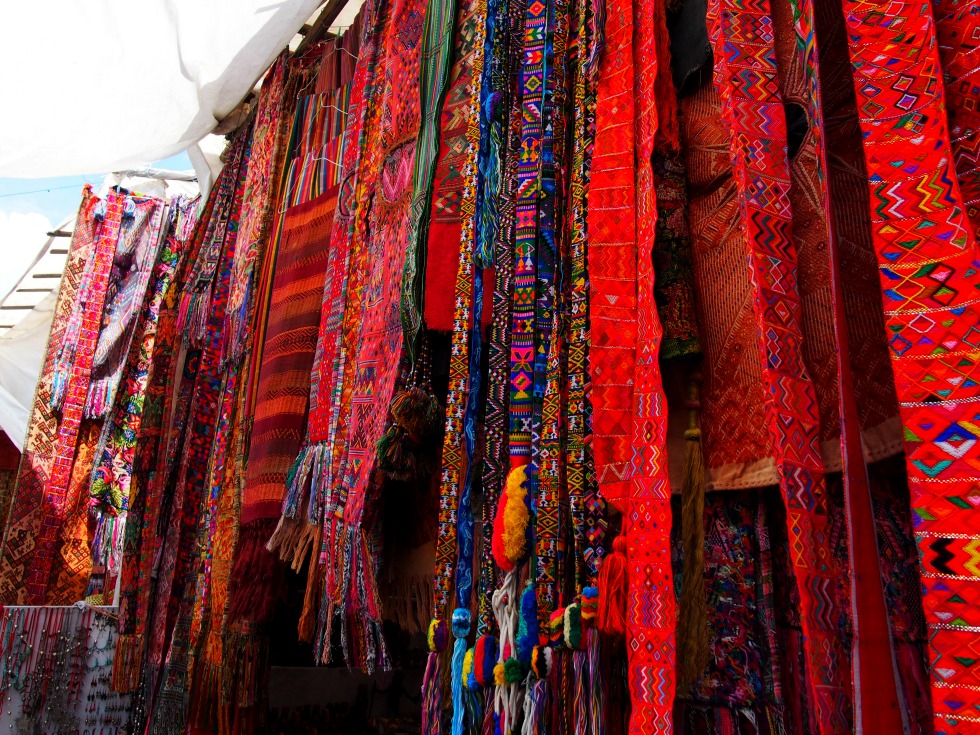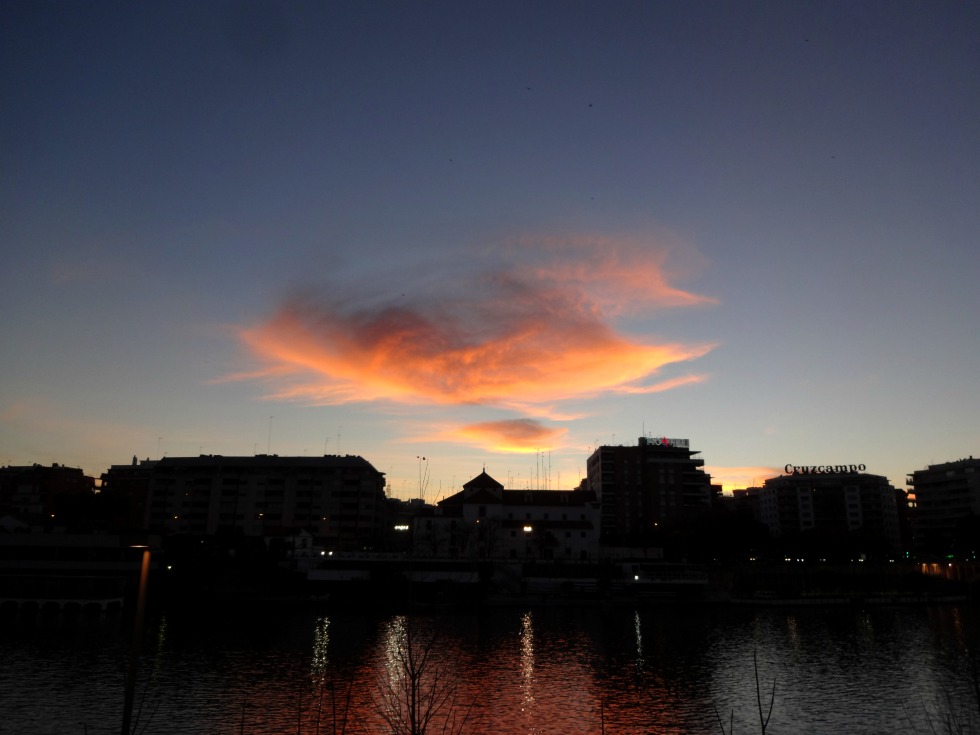
Beautiful sunset in the Drakensburg mountains in KwaZulu-Natal, South Africa
Travel is a beautiful thing that we all seem to love to do. It enables us to see the world in all of its complexity. Travel helps people become more open-minded and forge global connections. I fundamentally believe that travel has made me a better person.
Travel is also a global industry, dominated by white, western, upper-middle class individuals. And due to globalization and the ease of world-wide transportation, the tourism industry is booming. However, tourism has the potential to be incredibly destructive to the environment and to local communities. While I will not discourage travel, I will discourage traveling while ignorant about the impacts that we can potentially have on outside communities. If you are able to travel, you are incredibly privileged; the least we can do as privileged people is educate ourselves and try to make conscientious choices for responsible travel, to avoid the exploitation of locals and environmental harm.
Below is a list of nine simple things that you can do right now to travel more consciously, sustainably, and ethically, while minimizing exploitation abroad.
1. Learn your history
You’ve booked your plane tickets and are super excited to jet-set across the world. However, a big part of responsible travel abroad is having a basic understanding of the political, cultural, and global context of that country in the world. Do your homework. Pick up the books and research the history of the place that you’re visiting. We have the internet – use it! Read material written by a wide variety of people, particularly local perspectives on historical and current events. Having some background gives you more context for why things are the way they are.
Also, remember that a great deal of nations around the world have been colonized. Familiar with the phrase, “History is written by the victors”? This is an important concept to keep in mind when learning about a nation’s complex history, especially in the case of colonized nations and people. Colonization is defined as the domination of one region by an outside region. It is characterized by violence, seizure of resources, and erasure of indigenous rights, culture, and autonomy. Understand that traveling in colonized or formerly colonized nations affects the narratives that we are told in history books and in modern media sources.
Additionally, keep in mind that the United States (and other imperialist nations) has played a crucial role in shaping the politics of many nations. The United States has overthrown foreign governments and backed military dictators. Its political and economic interests in the resources of other countries have had drastic impacts on the development of certain nations. As someone from the United States, and recognizing that many of my readers are from the United States, I believe that it is important to have an understanding of the impacts of the United States’ foreign policy on the nations in which I travel, to have a better understanding of the current political and economic situations in these nations.
2. Learn some of the local language

My tiny notebook for on-the-go language learning. Full of words in Spanish and Arabic. It’s small, light, and super convenient.
I know that not everyone is bilingual (or trilingual, or quadrilingual, etc.) and that sometimes our international travels lead us to places where we don’t speak the local language. This is okay. However, it is unfair and entitled to assume that the people around you speak English. Just as you wouldn’t expect a foreigner to come to your country and start yammering to you in a language that you don’t understand, we shouldn’t do the same to locals during our travels abroad. Fortunately, learning a few key words and phrases can go a really long way towards more respectful communication.
Key words and phrases that I always try to learn in any language are: yes, no, My name is [name], What is your name?, How are you?, I don’t speak [French, Arabic, Xhosa, etc.], Do you speak English?, I don’t understand, How do you say [word] in [language]?, and so on. Everyone is capable of learning the bare minimum of another language. There is no excuse not to try, especially not with so many resources available, such as this blog post full of language learning tips, as well as audiobooks at the local library or the free university that is Youtube. Most of the time we don’t attempt to speak other languages because we are afraid of embarrassing ourselves, mispronouncing words, and inadvertently insulting people. However, I believe that people are appreciative of you trying to learn anything about their language, and that language opens doors to understanding people more fully.
One of my favorite questions to learn in a new language is, “Can you teach me a new word in [language]?” This was very helpful for me while trying to learn Arabic in Morocco. And it’s fun. It gets people talking about their language and allows you to learn some interesting vocabulary and/or grammar. In Spanish, I can ask more nuanced questions, such as, “Can you teach me a word that is used here in [Spanish-speaking country]?” (incidentally, this question yielded great results for me while traveling in Guatemala!) or “Is [word] appropriate to use in this country or should I say something different?” Languages are not homogeneous; they differ from country to country and region to region.
Write down the words and phrases that you learn, carry your notes with you, and refer to your cheat sheet when you’re out in the world. When I approach a local in a foreign country, I always try to begin the conversation in the local language, even if I have to ask if switching over to English is a possibility. Don’t assume that everyone can speak your language. Don’t assume that everyone wants to speak your language. Be humble, respectful, and ask questions.
3. Always ask before taking photos of people
Speaking of language, how about learning how to ask to take someone’s picture in their native language? (As a freebie, I’ll give it to you in Spanish: ¿Puedo sacar su foto, por favor?) Human beings are not props, nor are they animals in a zoo. An important part of responsible travel is asking permission before taking someone’s photo. Respect their wishes if they say no.
Also, understand that in certain other cultures, photography may have other connotations. In some cultures, having one’s picture taken is a serious offense. When in doubt, ask. Really want to take a picture of that beautiful Mayan church? I get it, but ask. If you are told no, put the damn camera away.
Additionally, I believe that it’s important to ask yourself why you need to take photographs of the people who you bump into around the world. And this is not the same as traveling somewhere, forging a friendship, and taking a picture of your friend. But when we are wandering around the streets of a foreign city and see a stranger and feel compelled to take their picture, we should ask ourselves why. Is it because they look strange or “exotic“? How are we planning on describing this person to our friends and family back home? It is so easy for our photography and language to tokenize and objectify people from other cultures. Being mindful of the power of photography and language can help avoid “othering” people from foreign cultures, i.e. deeming the photographer’s culture as the norm, and the photographed culture as strange, different, and less legitimate.
4. Be cognizant of who benefits from your dollar
Responsible travel means supporting local. Support local in your home community, and support local abroad. This may mean giving up some familiar comforts. This may mean staying in a family-owned inn or hostel as opposed to a luxury hotel. Eating at a local restaurant as opposed to supporting a chain. Participating in events and tours that actively work towards bettering the local communities… operated and/or owned by people from the community, not by outsiders.
And this is especially true for my readers from the United States, or for anyone traveling outside of the United States… don’t go abroad and support corporations from the United States. Starbucks will be there when you get home; go find a local coffee shop. Travel is not necessarily about being comfortable. It’s about learning, growing, and challenging preconceived notions. We don’t accomplish this by staying inside of our comfort zones. Take advantage of your time abroad to give back to the local economy, and maybe you’ll learn something new along the way.
5. Be sensitive when haggling… or just don’t haggle
We’re going to make something very clear: even the most “budget” traveler is enormously privileged. If you can afford to travel abroad, you can afford to pay fair prices for the goods and services that you consume while abroad.
I recognize that haggling in many places is a part of the culture. I also recognize that in certain places, “looking foreign” is enough to be charged more for that pretty shawl that you see in the local market. However, that’s okay. It’s okay to pay a little more, because at the end of the day it’s not going to hurt you to pay a little bit more money for something beautiful that you are going to cherish. We tend to take for granted the fact that, by traveling in the first place, we probably earn or have earned a living wage that enables us to move through the world as travelers and tourists. This is not the case for everyone, and may not be the case for the person selling you whatever it is they are selling you. And if you honestly can’t afford the higher price, then how much do you really need the object in the first place?

The “chichi” market in Chichicastenango, Guatemala is a haggler’s paradise… but be mindful of how haggling can be exploitative of local vendors and artisans
6. Get to know the locals
Should be obvious, right? Talking to locals is an important part of responsible travel. And I don’t just mean ordering in a restaurant before you return to your conversation with another tourist. I mean actually going out of your way to engage in meaningful ways with locals. Make friends, learn about their culture, and provide insights on your own culture to the people you meet abroad. One of the most important things about travel is that it breaks down stereotypes that we get from the media and popular culture, because we are out there experiencing things firsthand and can formulate our own opinions. This doesn’t work if you don’t actually engage with and befriend locals while traveling.
I have always found it to be incredibly easy to make friends with people in hostels. Unfortunately, people in hostels tend to be other foreign tourists. This is comfortable but not particularly helpful. While I do see the value in talking to other tourists and comparing experiences in the country that you’re visiting, sometimes I chose not to interact with other tourists in lieu of going out on my own. It gives me more initiative to start up conversations with locals who I meet around town. I encourage travelers not to fall into the trap of recreating their home country, abroad. If I were to go out with a bunch of other people from the United States while traveling abroad, I would be doing just that.
7. Use moments of discomfort as opportunities to ask questions, not to judge
Travel is going to be rife with moments in which we face culture shock. Because, go figure, human beings are really different. Some places in the world we eat with a knife and fork, some places we eat with our hands, and some places we use chopsticks. In some parts of the world, the animals that we keep as pets are eaten for dinner in other parts of the world. In some parts of the world, in order to purchase property we bring a case of beer and some cash to a local chief; in other parts of the world we sign these crazy things called mortgages…
The point is, no matter where you are in the world, when you are no longer in your native culture there are going to be things that shock you. This is okay, normal, and kind of awesome. What’s not okay is a reaction like, “They eat guinea pigs here? That’s disgusting.” And moreover, it’s a dangerous reaction that creates division. Just because you don’t understand another culture’s history and traditions doesn’t mean that there is something inherently wrong with that culture. Additionally, it imposes a standard centered around the culture of the “that’s disgusting” accuser. It makes this person’s culture “the norm”, and the observed culture inferior and even deviant in comparison. Don’t be that person; ethical travel means withholding judgement, and allowing the space to observe, experience, and enjoy another culture, even one whose norms are different than your own.
8. Don’t be a white savior
I’m going to say it again, just to be perfectly clear: don’t be a white savior. Don’t go into another nation expecting to solve its problems. Understand that every country has unique and complex problems that will not just go away with a little bit of hard work and grassroots effort. Understand that ideologies form over centuries, during which time we’ve experienced world-wide colonization and globalization. Think to your own country and its slew of issues. If we had the answer to our own nation’s problems, we would have solved them. We generally understand less about foreign countries than we do our own. So let’s stop trying to “save” the Third World, etc. when we don’t even know how to “save” ourselves.
I have met many people who want to work or volunteer abroad, and I get it. It sounds awesome. I don’t think that working or volunteering abroad is inherently bad, but I do believe that it should be done with an incredible amount of caution. If you are planning to work or volunteer abroad, I advise you to do a lot of research. Who is running the program? Is it a member of the local community or an outsider? What is the role of a volunteer or employee? What makes you qualified for this position? Is this a position that would be better filled by someone from the community itself? Where do the funds raised by this organization actually go? And so on, and so forth. Do your homework, so your work is not doing more harm than good. Good intentions and personal growth are not enough.
9. Check your privilege
It is an enormous privilege to be able to travel. Not everyone can travel, but some people can. As travelers, we are ambassadors for our countries and cultures. We are also guests in someone else’s home. Always be respectful.
In this post I have talked a lot about class and race privilege, but remember that there are many forms of privilege that we all experience or do not experience differently. Your socioeconomic status is a huge factor in determining your ability to travel. As is able-bodiedness. Having a disability can determine whether or not you are able to move about the world, or can seriously dictate how you move about the world. And don’t forget your passport – depending on your country of birth, travel from country to country could be very easy or nearly impossible.
Your race will change how people receive you in certain parts of the world. Your gender expression will change how people receive you in certain parts of the world. Your sexuality will change how people receive you in certain parts of the world. Human beings are complex and flawed, but having an understanding of how you benefit from certain privileges can aid you in being a more open-minded traveler. It can help you better understand what you are seeing, and how you are affected by the nuances of your own culture and of other cultures.

Feeling very grateful for all of the beautiful moments that I have experienced during my travels, such as this sunset over the río Guadalquivir in Sevilla, Spain
In conclusion
We should always be learning. We should always be questioning the things that we have been taught. We should always be respectful, compassionate, and active listeners. That will make us better travelers and better humans in a complex world. I am a culprit of committing pretty much every point on this list. Now I am more aware, and constantly unlearning and working towards bettering myself. I am not exempt from anything, neither is anyone else.
There is so much more to say on the topic of responsible, ethical, and conscious travel, to minimize exploitation and maximize prosperity for locals and travelers both. If you have any recommendations for me to discuss in future posts, contact me or write your thoughts in the comments below. For more information on ethical and sustainable travel, check out my Ethical Travel archives, as well as my Unlearning page.
What is your biggest struggle when it comes to responsible travel? What do you find most rewarding about it? Do you seek to incorporate issues of sustainability and social responsibility into your travels? How do you define responsible travel? Let me know in the comments below!










31 comments
These are really great tips. Learning the local language is a big one for me!
I’m a HUGE proponent of language learning. Even a little goes a really long way, and language opens so many doors when traveling (and at home, so you just can’t go wrong learning languages! :P). I’m glad that you found the tips useful. Thank you for reading and commenting, Sarah!
Thanks for the great tips. We do think it is really important to ask people before taking a picture. Learning basics like basic phrases as well as food, toilet, station go a long way. Especially in countries that don’t speak English. Even in one’s those do, people always feel more connected when you approach them in their mother tongue.
I completely agree! I know not everyone is going to be fluent in the native language, but it really is very little effort to learn a few key words and phrases to help you get around. To me it’s a basic part of being respectful in another country. Thanks for reading and commenting, Siddharth and Shruti!!
First, I think that your sunset picture in South Africa was absolutely stunning. Second, kudos to you for speaking out on a difficult topic. Most people don’t understand how lucky and privileged they actually are. Third, I will be more aware and keep these tips in mind when we travel. Love it 🙂
Thank you so so much for your kind comment!! I’m glad to hear that you got something out the the post. I think that many people easily get defensive when reading stuff like this and think “that’s not me!”… but the reality is that we all have work to do in building a more just world, myself included. Thanks for reading and for your kind and honest comment! 🙂
This is a great post – I really enjoyed it! I think your point on picture taking is great as so many people have the stance of “You’re in a public space, it doesn’t matter if I take your photo or not”.
Hi Jenn! Thanks for your comment!! Yeah, the picture-taking discussion is a big deal – I’m going to write a whole post on it at some point in the future. I think it’s especially problematic because a lot of pictures you see on Facebook, IG, etc. are taken by white travelers of Black/Brown/Indigenous people and children. I think these photographs are oftentimes (unintentionally) more about showcasing difference (in a “look how strange and different life is here” way) or worse, about showcasing and romanticizing poverty, than they are about painting an accurate picture about the reality of how these people live their lives. Because really, how many people who go to Guatemala and snap photos of Mayan women (for example) actually sit down and talk to them about the reality, way of life, joys, and challenges of being Mayan? Or are those photos really about getting instagram likes and looking like more a hardcore traveler to one’s followers? Hmmm…
Long story short, thanks for reading and commenting! This discussion is so so important and it’s one that I will continue to discuss on the blog! 🙂
It is important that someone says how things are. I have been having these thoughts in my head for a while, but havent put them down. You do so perfectly and I think every traveller should read this before embarking on their journey. Little things can make such a big difference!
Thank you for your kind comment, Kreete! I’m glad that you found this article to be a good resource 🙂
All of these are really great points. A simple “hello” or “thank you” in your host’s language goes a long way. Being aware of, and respecting customs without judgement is also an icebreaker.
Respecting customs is more than an icebreaker, I would say 🙂 It’s necessary! I believe that there are certain customs that, as foreigners, we don’t necessarily have to agree with… but it’s still important to respect those customs without judgement. Otherwise, we elevate ourselves by degrading another culture, and that’s a big problem. Thank you so much for reading and commenting, Shona!!
Great article on responsible tips as travelers and I think that we should all try and do them. I agree we should always be respectful, compassionate, and active listeners. I also found to ask permission like you mentioned before taking a photograph of the people. Thanks for sharing 🙂 #feetdotravel
Hi Stephanie! Thank you for your kind comment, I really appreciate it. Yeah, like I mentioned in my comment (ahem, small rant haha) to Jenn a few comments above, being conscientious about picture-taking while traveling is a really big deal to avoid tokenizing and objectifying people of other cultures. At some point soon I’ll write a whole post on it, stay tuned 🙂 Thanks for reading and for your positive feedback!!
I think you’ve hit the nail on the head with all of these and it’s extremely important to understand your impact as a visitor to a foreign country. The things you mention are what separate a traveller from a tourist and should be used a checklist before and during every trip. I love it! Thanks for sharing
Hi Travel Lexx! Thank you for your comment!! I agree, as travelers we can (unknowingly) have tremendous impacts on the places that we visit, and depending on how we carry ourselves these impacts may be positive or negative. That’s why is really important that we hold ourselves and our fellow travelers accountable for our/their actions.
To address the second part of your comment, I understand where you’re coming from about the traveler vs. tourist idea, though I personally don’t think there’s any difference between the two hehe. I understand that the terms are used in a “travelers dig deeper, while tourists scratch the surface” kind of way, but when it comes down to it I’m a traveler and a tourist everywhere that’s not home. What do you mean when you talk about the differences between being a traveler and a tourist?
Thanks for reading and commenting!
Alissa! We loved reading your post and agree on everything that you said. We are strong advocates for social justice too! We always are grateful when we travel as we know that we are privileged to be able to travel a lot. We always learn when we travel even in the most incomfortable moments 😉 Thanks for sharing a wonderful article 😉 Patrick and Cécile 🙂
Thank you so much, Patrick and Cécile!! I really appreciate the kind comment. And I’m glad to hear that you are strong advocates for social justice as well! How do you advocate for social justice issues in your everyday lives?
What a fantastic topic and a reminder that yes, we are privileged to travel and we should be remembering this! I always try to learn a few simple words, it’s always appreciated and the warmth and smiles you receive make it so worth it. Learning the history is always interesting as well, we are from the UK and over the past few hundred years, we have had such an impact on many, many countries and we have to remember that it’s not always been for the better so should be mindful of that. I feel you get so much more out of a country from getting to know the locals, it’s the people of a country that make it so special and not just the sites you visit and things you do 😀 #feetdotravel
Angie, thank you for your kind and thoughtful comment!! I completely agree. And absolutely, learning history is so so so important. Our nations have a long, bloody history of colonization and terrorism, and as travelers it’s important to be mindful of that legacy to avoid (inadvertently) continuing it.
You are so right that it is a privilege to travel, unfortunately not everyone realises this. Really enjoyed this post full of useful information. We adopt these principles when travelling and hope others will too!
Thanks so much, Paul and Carole! I’m glad to know that you found the post useful! 🙂
This is such a great post. I agree with everyone of these trips! It hurts me so much to see certain travellers gallivanting around the world are acting as an awful example of British culture. It’s so easy to forget when you’re traveling, but you’re witnessing a part of peoples lives – you might be able to pack up and leave but they can’t – and it’s so important to respect that! Thanks for sharing 🙂
Absolutely! Tourists can come and go, but the locals are the ones who really have to deal with the consequences of our being there. Every one of us need to hold ourselves accountable for our actions and the actions of our fellow tourists – hopefully that way we can change the culture of tourism to be less invasive and destructive. Thanks for reading and commenting, Sarah 🙂
You touched on some very valid points. To learn is to live and it’s far too easy to jump off a plane with your eyes half closed. Embrace the people and country you are now a part off and question every judgment of others.
I agree! And would add that it’s important to be very self-critical as well, so as not to do more harm than good. Thanks for reading and commenting, Barry 🙂
It is so true that many of us do not have the sensitivity required when we travel. It is always necessary to have a broad outlook and not be judgemental. One needs to respect the local culture and customs. All the tips that you have spelled out really hold true and would definitely need to more responsible travel.
Thanks for your kind comment, Sandy 🙂 I certainly hope that we collectively can travel more responsibly!
Wow, this article is pleasant, my younger sister is analyzing these kinds of things, so I am going to tell her.
Glad to hear that you found it useful!
Thank you ALISSA for great tips. I leave for my backpacking trip in 50 days so I’ll use these tips.
Felix S. Roberts